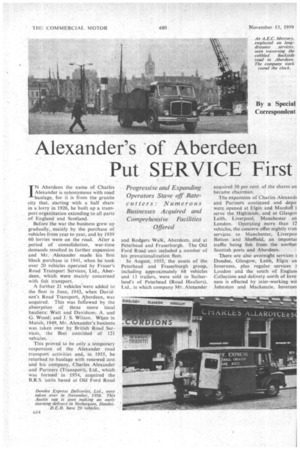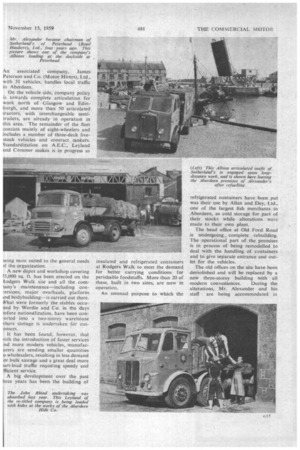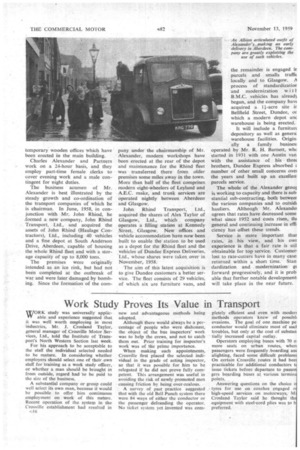Alexander's of Aberdeen Put SERVICE First
Page 116

Page 117

Page 118

If you've noticed an error in this article please click here to report it so we can fix it.
Progressive and Expanding Operators Stave off Ratecutters: Numerous. Businesses Acquired and Comprehensive • Facilities
Offered
IN Aberdeen the name of Charles Alexander is synonymous with road haulage, for it is from the granite city that, starting with a half share in a lorry in 1926, he built up a transport organization extending to all parts of England and Scotland.
Before the war the business grew up gradually, mainly by the purchase of vehicles from year to year, and by 1939 60 lorries were on the road. After a period of consolidation, war-time demands resulted. in further expansion and Mr. Alexander made his first block purchase in 1941, when he took over 20 vehicles operated by Fraser's Road Transport Services, Ltd., Aberdeen, which were mainly concerned
with fish transport, .
A further 21 vehicles were added to the fleet in June, 1943, when Davidson's Road Transport, Aberdeen, was acquired. This was followed by the absorption of . three more local hauliers: Watt and Davidson; A. and G. Wood; and J. S. Wilson. Wben in March, 1949, Mr. Alexander's business was taken over by British Road Services, the fleet consisted of 121 vehicles.
This proved to be only a temporary suspension of the Alexander road transport activities and, in 1955, he returned to haulage with renewed zest and his company, Charles Alexander and Partners (Transport), Ltd., which was forrned in 1954, acquired the B.R.S. units based at Old Ford Road and Rodgers Walk, Aberdeen, and at Peterhead and Fraserburgh. The Old Ford Road unit included a number of his prenationalization fleet.
In August, 1955, the assets of the Peterhead and Fraserburgh group, including approximately 613 vehicles and 13 trailers, were sold to Sutherland's of Peterhead (Road Hauliers), Ltd., in which company Mr. Alexander acquired 50 per cent. of the shares an became chairman.
The expansion of Charles Alexandt and Partners continued and depo were opened at Elgin and Macduff t serve the Highlands, and at Glasgov Leith, Liverpool, Manchester an London. Operating more than 12 vehicles, the concern offer nightly trun services to Manchester, Liverpoo Bolton and Sheffield, an importai traffic being fish from the norther Scottish ports and Aberdeen.
There are also overnight services 1 Dundee, Glasgow, Leith, Elgin an Inverness, plus regular services 1 London and the south of Englaru Collection and delivery north of Imre less is effected by inter-working %mil Johnston and Mackenzie, Invernes An associated company, James Paterson and Co. (Motor Hirers), Ltd., with 31 vehicles, handles local traffic in Aberdeen.
On the vehicle side, company policy is towards complete articulation for work north of Glasgow and Edinburgh, and more than 50 articulated tractors, with interchangeable semitrailers, are already in operation in this area. The remainder of the fleet consists mainly of eight-wheelers and includes a number of three-deck livestock vehicles and contract tankers. Standardization on A.E.C., Leyland and Commer makes is in. progress as ning most suited to the general needs )f the organization.
A new depot and workshop covering 5,000 sq. ft. has been erected on the lodgers Walk site and all the com 'any's maintenance—including contersions, major overhauls, platform ind bodybuilding—is carried out there.
What were formerly the stables occuiied by Wordie and Co. in the days
)efore nationalization, have been con,erted into a two-storey warehouse vhere storage is undertaken for cusomers.
It has been found, however, that vith the introduction of faster services ,nd more modern vehicles, manufacurers are sending smaller quantities o wholesalers, resulting in less demand or bulk storage and a great deal more mart-load traffic requiring speedy and fficient service.
A big development over the past hree years has been the building of insulated and refrigerated •containers at Rodgers Walk to meet the demand for better carrying conditions for perishable foodstuffs. More than 20 of these, built in two sizes, are now in operation.
An unusual purpose to which the refrigerated containers have been put was their use by Allan and Dey, Ltd., one of the largest fish merchants in Aberdeen, as cold storage for part of their stocks while alterations were made to their own plant.
The head office at Old Ford Road is undergoing, complete rebuilding. The operational part of the premises is in process of being remodelled to deal with the handling of containers and to give separate entrance and outlet for the vehicles.
The old offices on the site have been deniofished and will be replaced by a new three-storey building with all modern conveniences. During the alterations, Mr. Alexander and his staff are being accommodated in temporary wooden offices which have been erected in the main building.
Charles Alexander and Partners work on a 24-hour basis, and they employ part-time female clerks to cover evening work and a male contingent for night duties.
The business acumen of Mr. Alexander is best illustrated by the steady growth and co-ordination of the transport companies of which he is chairman. In June, 1958, in conjunction with Mr. John Rhind, he .formed a new company, John Rhind Transport, Ltd., and acquired the assets of John Rhind (Haulage Contractors), Ltd., including 40 vehicles and a fine depot at South Anderson Drive, Aberdeen. capable of housing the whole Rhind fleet and with a storage capacity of up to 8,000 tons_
The premises were originally intended as an ice rink, but had not been completed at the outbreak of war and were later damaged by bombing. Since the formation of the corn
pany under the chairmanship of Mr. Alexander, modern workshops have been erected at the rear of the depot and maintenance for the Rhind fleet was transferred there from older premises some miles away in the town. More than half of the fleet comprises modern eight-wheelers of Leyland and A.E.C. make, and trunk services are operated nightly between Aberdeen and Glasgow.
John Rhind Transport, Ltd., acquired the shares of Alex Taylor of Glasgow, Ltd., which company operates a filling station at Kennedy Street, Glasgow. New offices and vehicle accommodation have now been built to enable the station to be used as a depot for the Rhind fleet and the ,vehicles of Dundee Express Deliveries, Ltd., whose shares were taken over in November, 1958.
The aim of this latest acquisition is to give Dundee customers a better service. The fleet consists of 29 vehicles, of which six are furniture vans, and the remainder is engaged ir parcels and smalls traffie locally and to Glasgow. A process of standardizatior and modernization with B.M.C. vehicles has alread) begun, and the company haw acquired a 11-acre site ir Bellfield Street, Dundee, or which a modern depot ant warehouse is being erected.
It will include a furniture depository as well as genera warehouse facilities. Origin. ally a family businesi operated by Mr. R. H. Barnett, win started in 1931 with one Austin van with the assistance of his three brothers, Dundee Express absorbed number of other small concerns ovei the years and built up an excellen, parcels service.
The whole of the Alexander grout is working to capacity and there is sub stantial sub-contracting, both betweer the various companies and to outsidi
hauliers. Although Mr. Alexandei agrees that rates have decreased some what since 1952 and costs risen, th4
general and continuing is in effi. ciency has offset these trends. Service is more important thar
rates, in his view, and his owr experience is that a fair rate is stil obtainable for top service. Customer:
lost to rate-cutters have in many case:
returned within a short time. Stan dardization and modernization gt
forward progressively, and it is prob able that further notable development: will take place in the near future.
































































































































































































































































